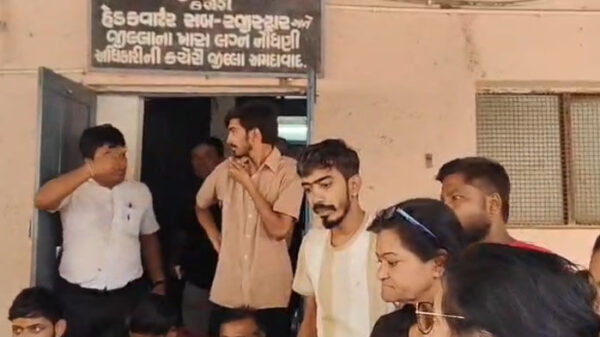On April 11, Rupesh Kumar Singh completed his 1000 days in prison. He was arrested on July 17, 2022, under the UAPA.
Rupesh had been reporting from the ground in Jharkhand as an independent Journalist since 2014. His stories covered human rights violations such as rape, illegal arrests and extrajudicial killings in Jharkhand as well as other parts of central India.
Just two days before his arrest, he had reported on Industrial waste being dumped in agricultural land belonging to Adivasis leading to catastrophic effect on the health of those living in Giridih district of Jharkhand.
Speaking to The Observer Post, Ipsa Shatakshi, Singh’s partner, said, “Rupesh ko mulzim banana ek tarah se samaaj ki ninda karna hai, sarkar ki taraf se, us samaj ki ninda jo samaaj ab darta nahi hai, badlao chahta hai, aur fasciwadi daman ke khilaf hai. Woh samaj jiski kahani Rupesh bata raha tha. (To frame Rupesh as a criminal is, in a way, to condemn a society—from the government’s side—a society that no longer fears, that wants change, and stands against fascist repression. A society whose story Rupesh was telling.)”
His arrest came after Singh posted a thread on his Twitter account about the impact of industrial and air pollution on residents of Jharkhand villages.
For Rupesh, journalism was his weapon to incite dissent against power, Ipsa said. “He wrote about the struggles of oppressed people, those who do not find their voices in the mainstream media. He believed in people’s journalism, serving them through it, even if he had to bear repercussions for it”.
“Rupesh treated journalism as a people’s tool to resist and to defend democracy”, she told The Observer Post.
‘Arrested, Targeted For Reporting’
Singh, 37, has been imprisoned on charges of having links with the Communist Party of India and illegally arranging funds for Maoists. He is booked under the draconian Unlawful Activities (Prevention) Act (UAPA) and sections of the Indian Penal Code (IPC).
Singh has reported extensively on the rights of Adivasis and other marginalized people for news websites such as The Wire, Janchowk, and Media Vigil. On July 15, 2024, he published a thread on his Twitter account, where he has about 4,900 followers, discussing the impact of industrial and air pollution on the health of populations in Jharkhand villages.
Rupesh was targeted by the Pegasus spyware, and was arrested on July 17, 2022, after a nine-hour raid on his residence. His electronic devices were seized and police charged him in a UAPA case involving a number of persons accused of Maoist activities. He was embroiled in three other cases and managed to secure bail in two cases.
On December 6, 2023, the Jharkhand High Court denied his bail in one of the cases.
Local journalists have testified to Singh’s consistent reporting up until his arrest, highlighting his work on cases involving rape, murder, and environmental pollution caused by a factory.
‘Pegasus Attack‘
Before his arrest, Roopesh was targeted by the Pegasus malware, as investigated by The Wire.
In 2019, Jharkhand Police accused journalist Rupesh Singh of having links with banned Maoist groups and detained him in Bihar, where he spent six months in custody.
According to a statement by the Committee to Protect Journalists (CPJ), citing Newslaundry, Singh believed he was targeted in retaliation for his reporting on the alleged extrajudicial killing of a tribal worker by security forces. He was released on bail after police failed to file a chargesheet within the legally mandated 180-day period.
On October 27, 2021, the Supreme Court of India constituted a Technical Committee to investigate allegations that the Union government had used Pegasus spyware to surveil journalists, activists, and opposition leaders.
The Court empowered the Committee to record statements from individuals connected to the case. The Committee, overseen by retired Supreme Court Justice R.V. Raveendran, conducted depositions and collected testimonies from petitioners, cybersecurity experts, and other concerned parties between December 10, 2021, and February 14, 2022.
Rupesh Kumar, and his partner, Ipsa Shatakshi are among the people that the Union allegedly spied on using Pegasus. The Wire published the list in July 2021. The Committee took his statement on January 20th, 2022.
At least three of Singh’s mobile phone numbers were potentially targeted by Pegasus spyware, according to a 2021 investigation by The Wire. His phone number, along with those of his wife and sister-in-law, were among the numbers allegedly targeted for surveillance using Pegasus spyware by the Union government.
Singh and Shatakshi are lead petitioners in a case at the Supreme Court of India concerning the government’s alleged use of Pegasus to target journalists and human rights activists.
Pegasus was created by the Israeli cyber-arms company NSO Group.
According to the petition filed by Singh in the Supreme Court, he has been falsely linked to Maoists, emphasizing that he was an independent journalist.
“The Petitioner vehemently and vociferously denies all allegations contained in the Supplementary Chargesheet. It is an admitted fact that the FIR had not named the Petitioner. It was only in the Supplementary Chargesheet that the Petitioner was arraigned as an accused, wherein baseless allegations have been made against him as a retaliatory measure for his activism and independent journalism,” the petition stated.
The Supreme Court earlier rejected the bail application of Rupesh in January, 2025, which the Committee for Justice and Peace (CJP), in a report, investigated, illustrating the case as “an inconsistent approach to UAPA cases”, amidst “growing concerns over UAPA misuse and press freedom crackdown”.
The Campaign Against State Repression (CASR), a civil society organization, in a press statement, said that Singh has been slapped with various cases, including anti-terror laws, to ensure that “he remains incarcerated for years, without trial.”
“It is a matter of serious concern that despite the Supreme Court giving orders in various judgments that bail is the rule and jail is the exception—advising the High Courts and lower courts to show courage in granting bail—the Supreme Court itself has shown cowardice by denying bail to journalist Rupesh Kumar Singh,” it said in a statement.
‘A long ordeal to defend Journalism and People‘
Rupesh’s wife, Ipsa Shatakshi, told The Observer Post that the 1,000 days of his imprisonment have not only impacted him but deeply affected their entire family, including their young son, as well as his work as a journalist.
“He thinks his father has served people, that he has done a lot through journalism, and that’s why he has been targeted,” Ipsa said.
Ipsa added that Rupesh is not the only victim in this ordeal—it is the entire society he tried to represent, those he stood for against oppression, corruption, and exploitation.
“He stood against the corporate-state nexus,” Ipsa said, referring to his work in Giridih. “He reported from there. But he didn’t just report—he fought for the issues he wrote about.”
Ipsa said her role goes beyond that of a partner; she is also a mother, and a partner in struggle.
She added that their son feels proud of his father. “He thinks his father is even more significant as a journalist because the government targeted him,” Ipsa said. “My father was a journalist too. And my son tells him, ‘You’re not a big journalist yet if you’ve not been to jail.’”
She pointed to the current situation in Jharkhand and Chhattisgarh, where the state-corporate nexus is consuming those who speak out—those who defend land, forests, water, and the Adivasi communities whose lives are caught in the crossfire of corporate plunder.
“What Rupesh stood for is not just about one region or one community,” she said. “This is a struggle tied to humanity’s own ordeals against oppression and exploitation.”
“The issue is not just that no one will be left to speak up,” she concluded. “The real danger is that we may not even survive. It will be too late before we realise that we have already lost our resources, our people, our history—our very existence—to fascist states that serve corporate interests.”
‘Activists demand release‘
On April 11, 2025, several civil society organisations, activists, journalists, intellectuals, and lawyers signed a letter addressed to the Chief Justice of India, demanding Rupesh Kumar Singh’s immediate release.
The letter stated that Rupesh had been “falsely implicated and declared arrested in four additional UAPA cases pertaining to alleged Maoist links.” It further noted, “Slapping multiple cases against Rupesh Kumar Singh shows the clear intention of the Indian state to ensure that he remains in jail for a very long time by turning the very process into punishment.”
The signatories asserted that Rupesh was being targeted for his journalism—his consistent documentation of human rights violations, state and corporate-driven environmental destruction, and his commitment to exposing truths that concern India’s most marginalized. While his targeting initially began under the Jharkhand Mukti Morcha government led by Hemant Soren, the case was later taken over by central agencies like the National Investigation Agency (NIA).
“Rupesh Kumar’s case compels us to recognise that it is not only the Hindutva-fascist BJP that is threatening press freedom and stifling dissent, but other ruling parties across states are equally complicit when their anti-people policies are challenged by pro-people journalism,” the letter said.
In India, journalists who report on corruption, state violence, governance failures, and people’s movements are often criminalised. The letter also raised concerns over the Indian state’s use of surveillance tools like the Israeli Pegasus spyware to target dissenters. Rupesh Kumar Singh, a known victim of such spyware—globally criticised for its invasive capabilities—was among those surveilled. His targeting, the letter argued, was a testament to the state’s desperation to silence his reporting and conceal the nexus between government and corporate interests.
Despite being a petitioner in the Supreme Court case against the use of Pegasus, Rupesh’s bail plea was rejected on January 27. “This is deeply concerning,” the signatories wrote. “While courts repeatedly uphold that ‘bail is the rule, jail the exception,’ this principle is frequently abandoned in cases involving activists and pro-people journalists—resulting in endless adjournments and prolonged pretrial incarceration.”
Additionally, Rupesh’s arrest gained international arrest as a case of targeting due to his critical reporting related to displacement, militarisation, pollution, fabricated cases against Adivasis and alleged extrajudicial killings of Adivasis. Many of these were published on the portal of ‘Janchowk’, a Hindi news portal.
The International Federation of Journalists (IFJ), in a statement after his arrest, said that “Journalists must be able to report independently and critically without fear of detainment, harassment, or intimidation. The IFJ condemns the arrest of journalist Rupesh Kumar Singh and urges the Indian authorities to immediately drop all charges against him”.
(Syed Affan is a writer and Journalist based in Delhi. He reportage focuses on Human rights, land conflicts, and policy)
































































